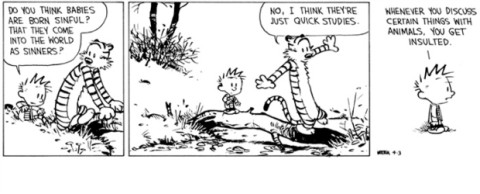
One of Bill Watterson’s wry Calvin and Hobbes comic strips opens with six-year-old Calvin asking "Do you think babies are born sinful? That they come into the world as sinners?" (See above.) The reply from Hobbes the tiger (which Calvin finds insulting) is, "No, I think they're just quick studies."
Precocious though he is, it’s not likely that Calvin would have come up on his own with the question he puts to Hobbes. Somehow, it seems, he has got hold of one corner of the Christian doctrine known as original sin. It is a contentious doctrine, not least because of the grim verdict that some versions of it pronounce on newborn babies. Hobbes is not the first to take a dissenting view in that regard.
What Hobbes dissents from, however, is only one of the assertions about original sin included in the predominant theological tradition. Besides asserting that there is such a thing, that tradition proposes an explanation of why there is, where the blame for it lies, what its consequences are, who is affected and how, what can remedy things and what cannot. Some of these propositions have been more controversial than others, and at times the controversy has deteriorated into hairsplitting, but the issues at stake have everything to do with Christian life and practice.




